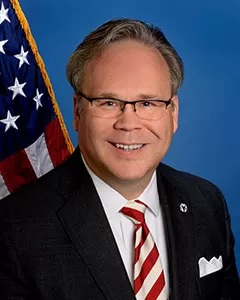NCUA Board Member Todd M. Harper
As Prepared for Delivery on December 2, 2020
Thank you, Mr. Chairman. And, thank you, Eugene and the rest of the team in the Office of the Chief Financial Officer, for your considerable efforts in preparing the proposed budget for 2021 and 2022.
As I mentioned at last month’s Board meeting, the draft budget concerns me, especially in light of the safety and soundness implications that the credit union system may soon face because of the pandemic’s economic fallout, the priorities of the agency related to consumer financial protection and the general transparency of the NCUA budget.
A budget is a forward-looking document that establishes priorities. Regarding the pandemic’s economic effects, I believe that we should plan for the worst and hope for the best. Accordingly, we should provide the anticipated resources at the start of the year instead of potentially scrambling later to catch up.
We already know that credit unions with higher risk profiles will require additional examiner attention and closer supervision next year as the economic effects of the pandemic unfold. Why, therefore, have we not engaged in a comprehensive Board-level discussion about the exam program to address this reality?
During prior economic downturns, like the 2008 financial crisis, the NCUA returned to a 12-month examination cycle. We also increased our field resources to handle safety and soundness problems at federally insured credit unions. Our sister agencies did the same.
In planning for the year ahead, I suspect our sister agencies may well increase their resources once again. If they do, we will look pennywise and pound foolish, especially if the ultimate economic impact of the pandemic hits the credit union system hard.
Think about it this way: If you knew a year in advance of the Great Chicago Fire that it would occur, would you flat line the number of firefighters in the budget? Of course not.
As I learned as a scout, we need to be prepared. That means always being ready to do your duty. We have a duty to credit union members and taxpayers to protect the Share Insurance Fund and the credit union system. We have a duty to prepare for any economic fallout. We cannot just call on examiners from the state supervisors and the other banking agencies to help us. They will be preoccupied with handling their own problem institutions. That is why I think we should plan ahead and budget for adequate field staffing needs now.
Instead, this draft budget will spend just $175 per million dollars of system assets. Before the last crisis, that figure bottomed out at $210 per million dollars in industry assets. That cutting of fat actually cut into the bone and left the agency flat-footed and ill-prepared for the financial crisis. We should not repeat that mistake.
Additionally, we know that the NCUA falls short when it comes to the agency’s oversight of consumer financial protection laws. Consumers, regardless of their financial provider of choice, deserve to have the same level of financial protection, yet we do not adequately assess consumer compliance management systems or even basic compliance with consumer financial protection laws in most credit unions.
We also do not assign a separate consumer compliance rating in the way that other federal banking regulators — and even some state credit union supervisors — do. What is more, the credit union system has continued to grow and become more complex. We have 40 additional consumer credit unions holding in excess of $1 billion in assets than we did just one year ago.
To better safeguard consumers’ interests and ensure that the credit union system lives up to its commitment to serving members, we need to provide the resources to create an effective, dedicated program for supervising compliance with consumer financial protection laws. Our efforts will ensure better consumer financial protection for credit union members and decrease the likelihood of reputational risk within the system.
To build an effective consumer compliance supervisory program, we need to do more than what the 2021 draft budget envisions. Adding just one person next year to develop tiered examination procedures up to and including FFIEC-approved examination procedures, lead consumer financial protection compliance reviews conducted at credit unions with higher compliance risk profiles and assist in developing training materials for examiners and credit unions is simply not enough. We need to look at the future state and move strategically to achieve this goal, not incrementally.
Finally, we need to transparently allocate our resources by noting that the actual 2021 budget is marginally higher than the 2020 budget when you account for money carried over from the prior year’s budget. And, we need to shine a light on the agency’s growing use of “overhires” as a way to keep the public counts of full-time employees relatively flat.
Ultimately, we may also need to make other changes to the budget, based on the input we receive from today’s witnesses and the comments that we will receive for the record.
In considering this budget, I am committed to doing what is right for credit union members, the agency and its employees, the Share Insurance Fund and the credit union system. I also know that if we take the time and work together we can identify a mutually agreeable budget that addresses the concerns of everyone, including those aimed at advancing economic equality and justice.
We must act to close the wealth gap, support minority depository institutions and ensure compliance with fair lending laws so that people of all colors can buy a home, purchase a car or finance college without being subject to discriminatory terms. In doing so, we will lift all boats and live up to the cooperative philosophy at the heart of the credit union movement.
Thank you, Mr. Chairman. I have no further comments at this time.




